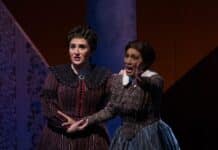Take note, Hollywood: when we adapt beloved stories, we should say something new with them, and consider using a new medium. The Puppet Co. is doing it right.
For the story of The Wizard of Oz in the cultural lexicon, what was in L. Frank Baum’s 1900 version of the story is somehow what’s new, and that is the version The Puppet Co. is faithful to, down to puppets that are visually true to W.W. Denslow’s 1900 illustrated character designs.
That narrative sits in contrast to the beloved 1939 film, the storyline of which is arguably more well-known than the original book’s — and they are quite different. Through the changes made to abbreviate the frequently 200+-page book and 2-hour movie into a 1-hour children’s morning show, the story’s message has been distilled with even greater narrative power and efficiency than more familiar versions. This version — L. Frank Baum’s version — of the story distills the story down to discussing each character’s inner strengths, quietly joking to the audience throughout that these characters already have what they seek.

A major way this is done is through the handling of the climactic scene with the Wizard. The Wizard, played with magical whimsy by Lee Gerstenhaber standing at her full height but wearing an over-face piece that gives her bushy brows and a mustache, is a sympathetic character we can feel gratitude and amusement toward. In the 1939 film, the Boss Tweed-like Wizard tells the characters that he’s rewarding them for risking their lives as he instructed and hopes that they are satisfied while appearing to consciously know that he’s giving them, without their knowledge, mere material symbols for what they already have. In this version, the Wizard tells them that they already have what they came for, but he will do his earnest best to give them what he has; no conscious deception is taking place. He’s a fool, but an honest fool, as someone once said. The whole story’s narrative, reinforced by Gerstenhaber’s giddy performance and staying true to Baum’s writing, is more clearly about how these characters earned what they sought independently and ought to appreciate themselves, as opposed to a fable about avoiding charlatans. Therefore, the key theme of the story is maintained more in this version than the movie everyone likes for an ultimately more satisfying story.
This story beat and performance aren’t the only elements that enable this: the story can also be about the beauty inherent in the characters they may not recognize through the diversity in their appearance thanks to the range of visual artistry and puppetry skills at play. The Puppet Co.’s The Wizard of Oz is an award-winning Mainstage Legacy Production: all its puppets were created by The Puppet Co. founders and their collaborators, and all Mainstage Legacy productions are completely original and completed with in-house work. It has been produced numerous times, including in 2009 and 2014. It even won a “Citation of Excellence” from the American wing of the Union International de la Marionette – USA: the highest honor for American puppetry. And no doubt, the skill in puppetry here is clear across designs and styles, under Christopher Piper, Allan Stevens, and MayField Piper’s work: the Scarecrow is a plush hand puppet, the Tin Man is constructed from metal, Dorothy is made out of wood, and the Lion is worn like a jacket as the puppeteer wears his head like a hat. The characters are all beautiful to behold, and despite their problems, they amaze and delight the audience: it is thus easy to register how they just don’t realize how incredible they are, reinforcing Baum’s story.
Numerous other puppets are worn as essentially foot-long bibs for diminutive characters, with arms controlled by the puppeteers, where their heads look hilariously huge in proportion as a result. This show truly is a celebration of creativity and visual arts: they are figuring out any method under the sun to communicate this story and laugh after laugh.
On top of the visuals, very rarely did the writing feel simplified for the enjoyment of a young audience, which is the magic of L. Frank Baum as well as the adaptation work of Christopher Piper. Any stilted simplification in the writing is that charming kind you know and love from classic children’s literature.

There are a few songs in this production, and they are unfortunately not the best. I understand that this show has a challenge on its hands: adapt L. Frank Baum’s book into an all-new musical production when whole Wikipedia pages exist listing ridiculously successful musical adaptations of the original story and new stories it inspired. But the songs in this production feel overtly half-baked. In contrast with the sheer excellence of the rest of the production, they are overtly underwhelming.
On top of that, there are a few fourth-wall breaks that reference the 1939 movie: for example, a character once starts singing, “We’re off to see the — oops!” Unless you’re commenting on the existing story in some way, sprinkled-in references often exist to remind audiences of another, usually more well-known show, and give the impression that you don’t think your show is good enough to get your audience’s attention without alluding to Another Thing. I’m not a 6-year-old who loves The Wizard of Oz and would enjoy hearing a reference to a favorite song, and I’m not here to rain on their parade, but as an artistic work, The Puppet Co.’s production has our attention and does not need to reference other works to get it.
Under Mollie Greenberg’s direction, the script, storytelling, puppetry, and jokes are utterly delightful, and just genuinely funny no matter your age. It’s hard to not look at a big goofy plush lion head and find it appealing, and it’s hard to look at a giant human head on a tiny foot-long Munchkin body and not laugh. It’s truly all-age entertainment — there’s never not something funny or beautiful to look at on stage. The story, about our world but a little more colorful, feels ideally suited for the puppet medium.
Running Time: Approximately 60 minutes.
The Wizard of Oz plays through August 4, 2024 (Thursdays and Fridays at 10:30 am, Saturdays and Sundays at 11:30 am and 1 pm), at the Puppet Co. Playhouse, 7300 Macarthur Blvd, Glen Echo, MD. Purchase tickets ($15 per person, under age 2 no ticket required) by calling 301.634.5380 or order them online.
Recommended for ages 4+. Helpful driving and parking instructions are here.
COVID Safety: Masks are strongly encouraged for all patrons age 2 and older
The Wizard of Oz
Directed by Mollie Greenberg
Starring Lee Gerstenhaber, Brigid Wallace Harper, Matthew Pauli, and Andrew Quilpa



